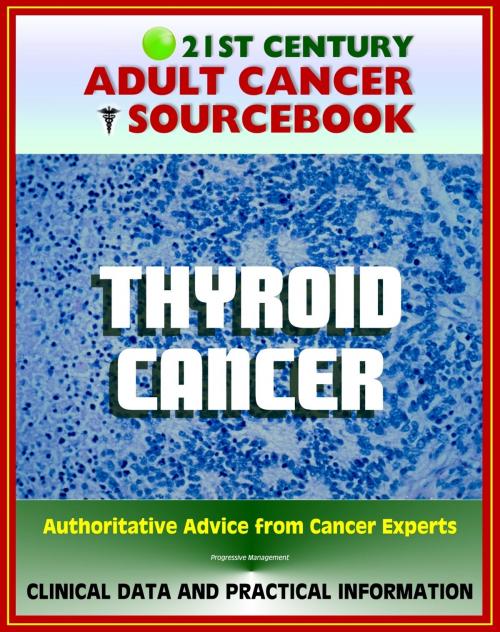21st Century Adult Cancer Sourcebook: Thyroid Cancer - Clinical Data for Patients, Families, and Physicians
Nonfiction, Health & Well Being, Health, Ailments & Diseases, Cancer| Author: | Progressive Management | ISBN: | 9781465763211 |
| Publisher: | Progressive Management | Publication: | October 29, 2011 |
| Imprint: | Smashwords Edition | Language: | English |
| Author: | Progressive Management |
| ISBN: | 9781465763211 |
| Publisher: | Progressive Management |
| Publication: | October 29, 2011 |
| Imprint: | Smashwords Edition |
| Language: | English |
Authoritative information and practical advice from the nation's cancer experts about thyroid cancer includes official medical data on signs, symptoms, early detection, diagnostic testing, risk factors and prevention, treatment options, surgery, radiation, drugs, chemotherapy, staging, biology, prognosis, and survival, with a complete glossary of technical medical terms and current references.
Starting with the basics, and advancing to detailed patient-oriented and physician-quality information, this comprehensive in-depth compilation gives empowered patients, families, caregivers, nurses, and physicians the knowledge they need to understand the diagnosis and treatment of thyroid cancer.
Comprehensive data on clinical trials is included - with information on intervention, sponsor, gender, age group, trial phase, number of enrolled patients, funding source, study type, study design, NCT identification number and other IDs, first received date, start date, completion date, primary completion date, last updated date, last verified date, associated acronym, and outcome measures.
Thyroid cancer is a disease in which malignant (cancer) cells form in the tissues of the thyroid gland. The thyroid is a gland at the base of the throat near the trachea (windpipe). It is shaped like a butterfly, with a right lobe and a left lobe. The isthmus, a thin piece of tissue, connects the two lobes. A healthy thyroid is a little larger than a quarter. It usually cannot be felt through the skin. The thyroid uses iodine, a mineral found in some foods and in iodized salt, to help make several hormones. Thyroid hormones do the following:
* Control heart rate, body temperature, and how quickly food is changed into energy (metabolism). * Control the amount of calcium in the blood.
There are four main types of thyroid cancer:
* Papillary thyroid cancer: The most common type of thyroid cancer.
* Follicular thyroid cancer. Hürthle cell carcinoma is a form of follicular thyroid cancer and is treated the same way.
* Medullary thyroid cancer.
* Anaplastic thyroid cancer.
Age, gender, and exposure to radiation can affect the risk of developing thyroid cancer. Risk factors for thyroid cancer include the following:
* Being between 25 and 65 years old.
* Being female.
* Being exposed to radiation to the head and neck as a child or being exposed to atomic bomb radiation. The cancer may occur as soon as 5 years after exposure.
* Having a history of goiter (enlarged thyroid).
* Having a family history of thyroid disease or thyroid cancer.
* Having certain genetic conditions such as familial medullary thyroid cancer (FMTC), multiple endocrine neoplasia type 2A syndrome, and multiple endocrine neoplasia type 2B syndrome.
* Being Asian.
Extensive supplements, with chapters gathered from our Cancer Toolkit series and other reports, cover a broad range of cancer topics useful to cancer patients. This edition includes our exclusive Guide to Leading Medical Websites with updated links to 81 of the best sites for medical information, which let you quickly check for updates from the government and the best commercial portals, news sites, reference/textbook/non-commercial portals, and health organizations. Supplemental coverage includes:
Levels of Evidence for Cancer Treatment Studies
Glossary of Clinical Trial Terms
Clinical Trials Background Information and In-Depth Program
Clinical Trials at NIH
How To Find A Cancer Treatment Trial: A Ten-Step Guide
Taking Part in Cancer Treatment Research Studies
Access to Investigational Drugs
Clinical Trials Conducted by the National Cancer Institute's Center for Cancer Research at the National Institutes of Health Clinical Center
Taking Time: Support for People with Cancer
Facing Forward - Life After Cancer Treatment
Chemotherapy and You
Authoritative information and practical advice from the nation's cancer experts about thyroid cancer includes official medical data on signs, symptoms, early detection, diagnostic testing, risk factors and prevention, treatment options, surgery, radiation, drugs, chemotherapy, staging, biology, prognosis, and survival, with a complete glossary of technical medical terms and current references.
Starting with the basics, and advancing to detailed patient-oriented and physician-quality information, this comprehensive in-depth compilation gives empowered patients, families, caregivers, nurses, and physicians the knowledge they need to understand the diagnosis and treatment of thyroid cancer.
Comprehensive data on clinical trials is included - with information on intervention, sponsor, gender, age group, trial phase, number of enrolled patients, funding source, study type, study design, NCT identification number and other IDs, first received date, start date, completion date, primary completion date, last updated date, last verified date, associated acronym, and outcome measures.
Thyroid cancer is a disease in which malignant (cancer) cells form in the tissues of the thyroid gland. The thyroid is a gland at the base of the throat near the trachea (windpipe). It is shaped like a butterfly, with a right lobe and a left lobe. The isthmus, a thin piece of tissue, connects the two lobes. A healthy thyroid is a little larger than a quarter. It usually cannot be felt through the skin. The thyroid uses iodine, a mineral found in some foods and in iodized salt, to help make several hormones. Thyroid hormones do the following:
* Control heart rate, body temperature, and how quickly food is changed into energy (metabolism). * Control the amount of calcium in the blood.
There are four main types of thyroid cancer:
* Papillary thyroid cancer: The most common type of thyroid cancer.
* Follicular thyroid cancer. Hürthle cell carcinoma is a form of follicular thyroid cancer and is treated the same way.
* Medullary thyroid cancer.
* Anaplastic thyroid cancer.
Age, gender, and exposure to radiation can affect the risk of developing thyroid cancer. Risk factors for thyroid cancer include the following:
* Being between 25 and 65 years old.
* Being female.
* Being exposed to radiation to the head and neck as a child or being exposed to atomic bomb radiation. The cancer may occur as soon as 5 years after exposure.
* Having a history of goiter (enlarged thyroid).
* Having a family history of thyroid disease or thyroid cancer.
* Having certain genetic conditions such as familial medullary thyroid cancer (FMTC), multiple endocrine neoplasia type 2A syndrome, and multiple endocrine neoplasia type 2B syndrome.
* Being Asian.
Extensive supplements, with chapters gathered from our Cancer Toolkit series and other reports, cover a broad range of cancer topics useful to cancer patients. This edition includes our exclusive Guide to Leading Medical Websites with updated links to 81 of the best sites for medical information, which let you quickly check for updates from the government and the best commercial portals, news sites, reference/textbook/non-commercial portals, and health organizations. Supplemental coverage includes:
Levels of Evidence for Cancer Treatment Studies
Glossary of Clinical Trial Terms
Clinical Trials Background Information and In-Depth Program
Clinical Trials at NIH
How To Find A Cancer Treatment Trial: A Ten-Step Guide
Taking Part in Cancer Treatment Research Studies
Access to Investigational Drugs
Clinical Trials Conducted by the National Cancer Institute's Center for Cancer Research at the National Institutes of Health Clinical Center
Taking Time: Support for People with Cancer
Facing Forward - Life After Cancer Treatment
Chemotherapy and You















